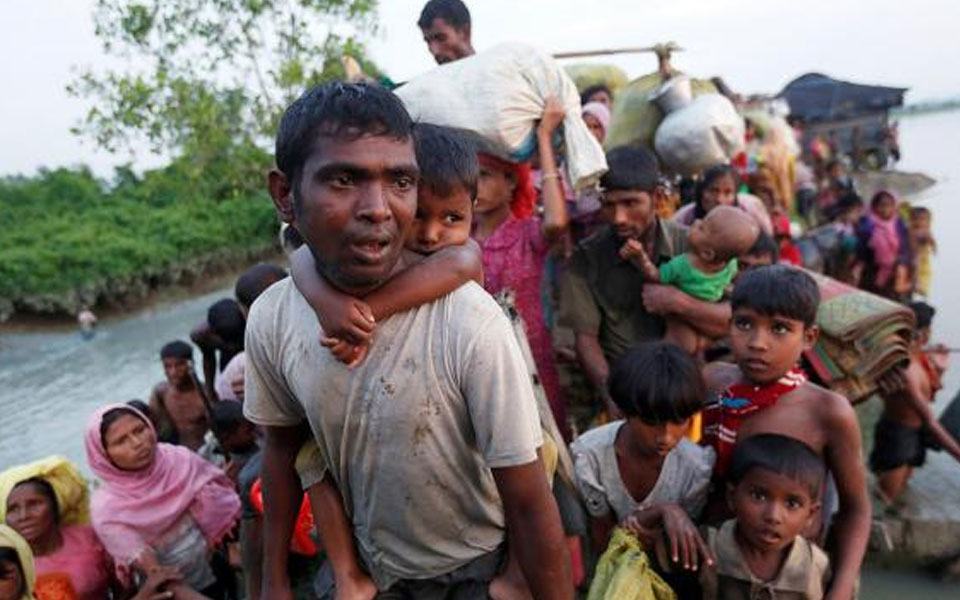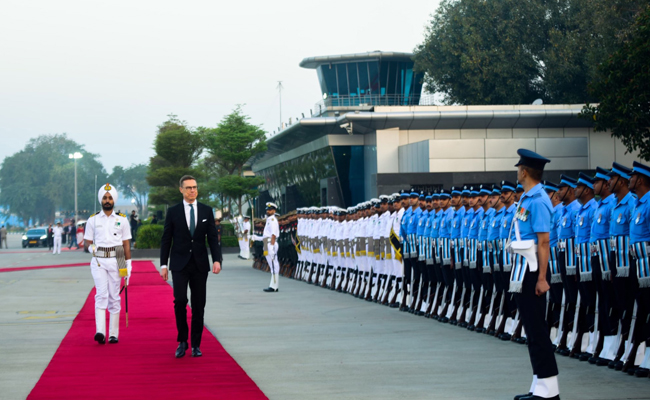Geneva, Sep 18 : A UN fact-finding mission published on Tuesday the most extensive report till date on the continued persecution of the Muslim minority Rohingyas in Myanmar since 2011 in the states of Kachin, Shan and Rakhine.
The 44-page report was based on more than 800 interviews of survivors and videos, photos as well as satellite images that detailed the atrocities and rights abuses against the community, Efe news reported.
"During their operations the Tatmadaw (military) has systematically targeted civilians, including women and children, committed sexual violence, voiced and promoted exclusionary and discriminatory rhetoric against minorities as well as established a climate of impunity for its soldiers," said the chair of the mission, Marzuki Darusman.
The report said that Myanmar's policy of destruction in Rakhine might have destroyed evidence that could have helped in future investigations of the crimes, including those of genocide.
The report examined various episodes of violence over the years, especially the one that erupted in August 2017 in Rakhine that led to the exodus of more than 800,000 people, currently living in neighbouring Bangladesh in overcrowded refugee camps.
An earlier and more concise version of the report on August 27 had concluded that there were elements of intentional genocide by the country's armed forces in the 2017 offensive, that was launched following a series of attacks on government posts by Rohingya rebels.
"The crimes themselves and the manner in which they were perpetrated, were found to be similar in nature, gravity and scope to those that have allowed for genocidal intent to be established in other contexts," said Radhika Coomaraswamy, another member of the mission.
The mission considered that by conservative estimates at least 10,000 people were killed during the 2017 Army offensive, globally condemned as "ethnic cleansing".
"These policies and practices violate Myanmar's obligations under international law and amount to criminal conduct. They are also unwarranted. Military necessity would never justify killing indiscriminately, gangraping women, assaulting children and burning entire villages," the report stated.
The experts blamed the military leaders for the crimes committed during the military campaign and also condemned Myanmar's de facto leader and Nobel Peace Prize laureate Aung San Suu Kyi for failing to use her position to prevent the atrocities in Rakhine state.
The mission also gathered proof of war crimes and crimes against humanity in all the three states.
The experts asked the UN Security Council to refer the case to the International Criminal Court or create an ad hoc international court to try these crimes.
It also recommended individual sanctions against those identified as allegedly responsible for these crimes and an arms embargo on the country.
Let the Truth be known. If you read VB and like VB, please be a VB Supporter and Help us deliver the Truth to one and all.
Washington: Tensions rose at the US Capitol on Tuesday as lawmakers sought clearer answers from the Trump administration on the objectives, duration and costs of the ongoing military campaign against Iran, even as preparations advanced for votes aimed at curbing the president’s war powers.
Senior officials, including Secretary of State Marco Rubio, briefed members of the House and Senate for a second consecutive day behind closed doors, as reported by the Associated Press. The sessions came ahead of votes on war powers resolutions that would limit President Donald Trump’s authority to continue joint US-Israel operations without congressional approval.
Rubio told reporters that the president acted to prevent Iran from striking first. He rejected suggestions that Washington moved only because Israel was poised to launch its own offensive, saying instead that Trump believed the weekend presented a rare opportunity to act with maximum impact. “There is no way in the world that this terroristic regime was going to get nuclear weapons, not under Donald Trump’s watch,” Rubio said.
ALSO READ: BLR airport sees 34 int'l flight cancellations amid Middle East crisis
The conflict has widened following US and Israeli airstrikes on February 28 that killed Iran’s Supreme Leader, Ayatollah Ali Khamenei. Iran has since launched missile attacks targeting US military bases in the region. At least six American service personnel have died so far.
The administration has indicated that supplemental funding may be required to sustain operations. It added that the concerns among lawmakers about the financial burden and potential for a prolonged engagement has disrupted legislative business, sharpening political divisions at the start of a competitive midterm election cycle.
Associated Press cited Senate Democratic Leader Chuck Schumer’s concerns about what he described as possible “mission creep.” Senator Angus King questioned whether the United States had been drawn into war at Israel’s urging, while Senator Elizabeth Warren asked how the campaign aligned with Trump’s “America First” pledge to avoid extended foreign conflicts.
Defence official Elbridge Colby told senators the president had directed the military to degrade Iran’s missile capabilities and prevent it from acquiring nuclear weapons, stressing that the objective was not nation-building. Trump, speaking separately from the Oval Office, dismissed claims that Israel had forced his decision and suggested the conflict could continue if necessary. He has not ruled out deploying US ground troops.
Senator Richard Blumenthal was quoted by Associated Press as saying that he feared the possibility of American boots on the ground while Republican Senator Markwayne Mullin defended the operation, saying the president had acted decisively.
Uncertainty over Iran’s future leadership has added to concerns, with questions mounting about who might succeed Khamenei as Trump rejected the idea of backing Reza Pahlavi, the exiled crown prince of Iran’s former monarchy. Senate Majority Leader John Thune said the future of Iran should be determined by its people and House Speaker Mike Johnson said the United States would not engage in nation-building.
Lawmakers from both parties also reported a surge in calls from constituents seeking assistance for Americans attempting to leave the region as hostilities intensify.
The US Constitution grants Congress the right to declare war, however presidents have routinely begun military activities without formal declarations. Both houses are anticipated to vote on proposals that would require explicit congressional approval to continue operations. Some members have also argued that if constraints are not imposed, Congress should consider issuing an Authorization for the Use of Military Force to put lawmakers on the record.
Associated Press quoted House Democratic Leader Hakeem Jeffries questioning the rationale for the campaign and saying there would be strong support among Democrats for the resolution. Johnson, however, warned that restricting the president during active combat could pose risks.





